|
by Kris Mason 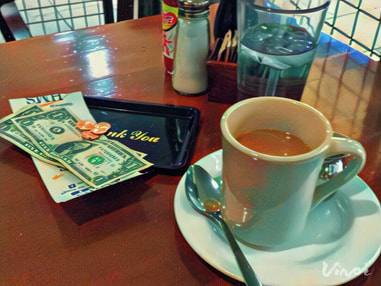 Did you know that in 18 different states here in the U.S. the minimum wage will increase above the Federal level by as much as 40% and more? Waiters across the country have always complained about their non-existent paychecks caused by their tipped wage. In fuzzy numbers, if your supposed to make $7 an hour, you get paid around $2 because your cash tips will be at least the roughly $5 needed to guarantee that you make at least that minimum hourly wage. As a waiter, my coworkers always had their one tried and true, fall back complaint, “I worked my butt off, and I served a ton of people in huge parties who ate and drank, and rang up a huge tab, and made a big mess that I had to clean up, and then they turned around and left a really crappy tip; and that sucks because (here it comes…) I only make like $2.00 an hour!” Although I’ve never joined in on this particular rant, it is my fantasy to have every table leave a huge tip, every day, all year long. Everybody tips. Some great; some not so much. Most waiters compliment themselves when a tip is great and mercilessly shred the customer when it isn’t. When it doesn’t turn out in the server’s favor, watch out, they’ll go off! The rant usually begins with flying expletives. Faces turn red. Waiters take to Facebook and for the millionth time begin to explain to “You People” that their wage (without tips) is only about $2.13 an hour and is completely wiped out when it’s used to cover the taxes on their cash and credit card tips. These are straw man arguments constantly repeated by amateurs who have failed to do the math themselves. They want you to feel bad for them about the $2 part when in reality the cash part is more like $15 rather than $5. They explain about all the people that have to be tipped out, the bartenders, the bussers, the hostesses. In crunching the numbers, they argue that if you tip less than what they have to pay out (or worse, nothing) it will cost them money for you to go out and eat. Sure. Totally true… if they only wait on that one table and then immediately go home. What an awful job that would be; earn two bucks an hour, receive no paycheck, pay for some family to go out to eat and then get sent home, in the red. I read similar rants like these at least once a month. It’s so familiar that it almost seems cut and pasted. From the outside looking in, I’m inclined to think this rant would produce fewer improvements on tipping and create more people trying to convince their favorite waiter to quit their horrible job. So where do we go from here? We all enjoy venting; but how can we blame customers now that the minimum wage no longer supports the “poor mouth” narrative? Some states are aiming for $15 an hour by 2020. In the state where I work, the minimum wage was increased to $10.50 per hour; for tipped employees, like myself, it’s $7.50. That’s right, my tipped wage is higher than the Federal Minimum Wage. It’s going to be even harder to rant about crappy tippers when you make $12 to $15 an hour. "That’s the dirty little secret; waiters make BANK!" If you really want a rant, I have one for you. Here goes nothing... Quit pissing and moaning about who tipped you poorly. It’s none of your business how well an individual tips. Did it ever occur to you that your vivid imagination about you being the greatest gift to the restaurant industry might be far from the reality of your skill set? If you suck at waiting tables (and many of you do), and you work at the most dysfunctional restaurant (as I know some of you do), you will make in the ballpark of $15 per hour. Last June and July, just my tips averaged out to $28 an hour; and I worked less that 30 hours because we’re “slow” for the summer. I averaged $40 an hour over the period of Christmas and New Year. That’s the dirty little secret; waiters make BANK! Why else would grown adults wait tables?! It’s the most amount of money, in the shortest amount of time, under the easiest conditions. That’s right… your job is easy! If you are doing a job that can be performed well by a teenager… it’s easy. I don’t get where the outrage of one crappy tip comes from. Your job is hospitality; and hospitality has very little to do with how you feel you’re being treated. The truth is, it probably isn’t just “one crappy tip.” That probably happens to you all the time; that’s your real issue. You can’t contain yourself. When someone orders water to drink, you can’t help but visibly roll your eyes or audibly exhale; and when that table tips you poorly, you get bent and take your miserable attitude to the next table. So, just because you say, “Hi, I’m What’s-his-face, and I’ll be taking care of you,” your face actually says, “I want all you cheap bastards to die a miserable death because I’m awesome and you suck!” And when that table forms the opinion that you are a bit of an insincere jerk, and tips you accordingly, now they suck too? It’s time to turn the spotlight on yourself. If the public isn’t tipping you consistently well and you are paying for everyone to go out to eat and your last resort is to lash out and complain about the (no longer a thing) $2.13 an hour, you’re doing it wrong and this might not be your ideal vocation. If you are making the $15 to $30 an hour that I know is out there and being earned (not made) by so many of us, daily, in good times and bad, kindly shut the hell up about the minimum wage! Wow! That felt great! In the restaurant/hospitality industry a waiter gets more when they give more. As a provider of hospitality, the more I do for my guests, the more I earn; and that is rarely (if ever) related to the current minimum wage. Since you can’t legitimately complain about your wage anymore, here’s some more bad news… A study from Princeton has just revealed that the majority of diners tip an average of 18%. Even worse, less than 2% of those who go out to eat leave no tip at all. It sounds more like a job to be bragging about rather than complaining. Ya, that’s the bad news. If you make $10 an hour and your guests are giving you 18% of your sales and you go home penniless because you had to “pay for your tables to eat out”… it’s not them, it’s you. I do Waiter Boot Camps at your restaurant. Contact me to schedule a meeting. 480-600-6973
2 Comments
by Kris Mason  Okay, this is the way we do this. Why? Uhhhhh... because that’s the way we’ve always done it. Too often, we exist from our memory. Doing it “this way” has gotten us this far; why not keep doing it this way? Our memory is safe. Our memory is predictable. It doesn’t take any extra effort to do things the way we’ve always done them. Don’t try to reinvent the wheel! That image is a cartoon in most people’s heads. A little cave man wearing an animal skin, wielding a primitive hammer and chisel, standing next to a square stone and then a crudely rounded stone. The truth is, if nobody “reinvented the wheel” we would still have big, clunky, stone wheels on everything. Imagine the expansion across the West with horses struggling to pull the pioneers in covered wagons with two big stone wheels stuck to the bottom. The wheel is a concept with hundreds of thousands of reinvented versions. Without wheels there are no gears. Without gears there are no machines. Without machines we are still standing around in animals skins banging on rocks with other rocks. Everything exists because we innovate. We create things that have never existed before then change them, and tweak them, modify them and improve on them, and create new materials to make them over again. We reinvent all the time; and it’s a good thing that we do. I much prefer digital downloading to saving a song on a floppy disk just as I prefered the CD to the 8-Track Tape (Google it kids). Restaurants are constantly reinventing the wheel; and in the last decade, the industry has been forced to innovate to stay alive. When the housing market crashed in 2007, it set off a chain reaction that had a devastating effect on the restaurant industry. Since then, restaurateurs have updated menus and food quality, and along with streamlined facelifts of outdated looks, offering enhanced take-out options and ordering, they’ve improved their entertainment technology by providing free-wifi and engaging you through social media. We innovate or we die. If you don’t believe me, just ask your Travel Agent… or the folks at Blockbuster Video… or a bookstore… or the mall… or the circus. As a waiter in a restaurant, my job is to bring you things that you ask me for. Like the wheel, it is a concept that is unchanged from the beginning, yet is in desperate need of a good reinvention. When ranting, I lay a great deal of blame on the individual server who seems reluctant to up their game and raise the current standard. Unfortunately, some waiters are only really happy when they are commiserating about how much they hate customers while counting the fists full of cash. Social media has banded them together and they share stories and memes that paint the public (and ironically the people paying their bills) in a less than flattering light. That being said, It’s time to shine the ugly lights on the employer's now. "There is more a sense of feeling blown off than blown away." If you’ve ever opened a restaurant, you’ve had a chance to see how a staff is hired, brought together and trained to embody the company’s core culture and belief system. A staff of cheerleaders at the top of their game work tirelessly for weeks to assure that when the doors open to the public for the first time, their guests are blown away by the attention to detail and are so warmed by the genuine hospitality that they include the restaurant in their everyday plans of how to feed their family. It’s impressive. If you’ve ever been to a restaurant that has been opened for a few years, things are… different. You wait an hour or longer to be led to a table by a truly disinterested high school student, only to be hit with a lifeless, distracted, “Hi I’m Jason and I’ll be taking care of you tonight, what can I get you started off with to drink?,” with a tone that implies he has better things to do and you’re not helping. No attention to detail. No genuine hospitality. There is more a sense of feeling blown off than blown away. I can tell you exactly what happened. Training a wait staff (or any staff for that matter) is like the telephone game. You line a bunch of people up and the first person in line whispers into the ear of the person closest to them. That person turns to the next person in line and tries to repeat word for word what they just heard. This is repeated until the last person says out loud what they have been told. Laughter ensues. In the game it’s funny because the final statement has evolved and/or deteriorated so far from the original statement. So, the cheerleaders come in and whip the staff up into a frenzy and focused positive energy and joy. They appoint certified trainers to take over the teaching process; then through attrition, the certified trainers leave and other trainers are moved into their places. Those trainers are now passing the information on to new hires, while making sure that tax forms and federal compliances are being adhered to (something that the cheerleaders never dealt with). Eventually, the trainer (who just got another job somewhere else, but hasn’t quit yet) trains two more people; but instead of teaching the company culture and core belief system, he teaches them the shortcuts that he has learned, how to not do side work, which managers are a pushover and will allow you to get away with the most, and finally emparts everything that he hates about “this place” to those last two new hires, planting a tiny cancer in your organization. He quits, unannounced, and the person with the most seniority is automatically the new trainer. Now that this is the new standard, if a new hire shows up for training on a shift that there is no trainer, the person on the clock with the most seniority is the trainer for the day. At my worst job, I was trained by somebody who had only been there for two weeks. It consisted of, "Just fill out all the stuff and read all the packets and I’ll sign off all your paperwork." "Great waiters aren’t developed and lousy servers The only screening process for a waiter now is, “Do you know how to wait tables,” and the only standard really is to show up. There is no need to assess the quality of the new hire because management believes there is such a great training system in place to take care of the rest. The sentiment in the industry over the last 20 years is that servers are a disposable commodity; there is always another one standing by, ready to fill in. It’s time to address the crisis of service. Great waiters aren’t developed and lousy servers are rarely weeded out. How much of the original enthusiasm and energy is in your restaurant? Are you training your staff with your corporate core culture and belief system, or are you just checking the boxes, teaching the shortcuts and signing off on the paperwork? The movement has started to do away with tipping and pay the waitstaff a flat (and very low by comparison) wage. It’s called “Hospitality Included.” It isn’t faring well with diners; but it’s only a matter of time before a solution is discovered. If we don’t fix what’s broken, waiters will become like that cartoon image of that crudely rounded stone. Stop living out of our memory; start reinventing the wheel when it comes to waiters. We innovate or we die. I do Waiter Boot Camps at your restaurant. Contact me to schedule a meeting. 480-600-6973
by Kris Mason  I’ve been… down. I write a blog that requires me to look at what I do for a living in a positive light to try to encourage people to embrace the hospitality side of the industry and not focus so much on the darker underbelly of the business. I try to rant while not berating anyone; I attempt humor; and even though my philosophies steer my life in an above average, positive mindset, I’m human and subject to a severe case of the blues just like everybody else. I’ve been… down. I’ve started this article multiple times and this is the first time in the last eight weeks that I’ve made it past, “I’ve been… down.” I still don’t have enough energy to high five myself; but there is a mental victory dance that will have to suffice. The hardest part has been going to work every day. I wait tables. You’re probably thinking, “No brainer,” or “Just dial it in,” or the apathetic, “Yeah? And?...” Easy to picture since in many cases your server can seem clinically depressed some of the time anyway. The problem is, this isn’t a part time job or a little side gig for me. It’s how I pay my mortgage, feed my family and keep the lights on. I’m in the hospitality industry and I spend each day at work trying to maximize your positive experience to maximize my take home income. Here’s what I’ve learned. When you have a great dining experience, I take home more money. When I, “Just dial it in,” I take home less money. I can’t make you happy with red, puffy eyes from crying. You don’t leave as much money when I mumble things or give you the thousand yard stare. When I’m… down, I get distracted. I immediately forget what you just said to me. I didn’t forget your straw; I forgot that you even asked for a straw. Somehow, I have to figure out how to bring my A Game while playing at a D+ or at best a C-. There are no sympathy tips for being… down. There are times when having a job in a cubicle seems like a pretty good deal. My income wouldn’t be affected by my poor performance. I could ignore my co-workers, send out a few emails, and take multiple breaks with a long lunch. Just dial it in. I know that every workplace would prefer that we all leave the problems of our personal life at the door when we clock in. Waiting tables is one of the professions where money is lost for a lack of peak performance. Granted, I would like my emergency response team to be working at their highest level if things go horribly wrong in my life; but you get what I’m saying. Unless you work directly with the public, face to face, you can have off days go completely unnoticed; and you get paid the same amount either way. I have discovered that making a connection with my tables, and customizing their experience maximizes my take home pay. These last eight weeks have been my greatest challenge. I’ve exhausted myself trying to bring my energy level up to not let on about how low I feel. At times it seemed like I’m just acting; and sometimes that act was just enough to get me through the table. "If you used to make more money when you first started waiting tables, I invite you to run some basic drills." Last week I was knocked off guard when the woman at my table made a connection with me. As her meal was coming to an end and I dropped off her check, she asked me what I did in my spare time. I froze. I had no idea what to say first. Part of being… down right now is the feeling that my free time doesn’t belong to me. There are so many things in my life that are in a state of flux and that gives me the sense that I have little or no control over any of it. She knocked everything loose. I was spiraling out of control. I still hadn’t said a word in response. It felt like an hour had passed since she asked the question and I just stood there with my mouth half open trying to form a word to somehow compile a sentence. She broke the silence first in what could only have actually been a long second or two. “You must just see a ton of interesting people all day long. It would be a great place to work to watch people if you were a writer or something.” I quickly shared my story and blog address with her and the conversation unclogged. I was still busy and as I passed her table I saw a hundred dollar bill for her $46 check. I know I had woken up because the voice in my head thought to myself, “Great, now I need to go find change.” When I came back to the table, she was gone. As I picked up the tray and carried it back to the servers station, I saw her wave going out the door and she mouthed, “Thank you,” and threw in a little namaste type bow. At my computer I picked up the bill only to find a second one just like it hiding underneath. 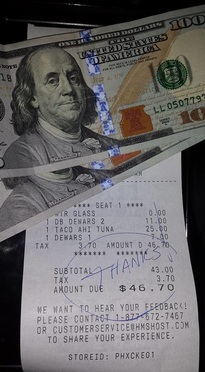 The trick (if you can call it that) was to put all my dwindling energy into the basics. Some of the greatest coaches, regardless of the sport, achieve excellence by simply drilling the fundamentals; they practice the routine, the same things that are practiced in Jr. High and High School. No matter how advanced or flashy the games seem, it’s the basics that make the winning team. I ran my basic drill so well, the simple, unselfish generosity of being basically attentive, that I made a connection even when I wasn’t aware it was there. I don’t know her story. She could have been conducting some great “Pay it Forward” experiment, I have no idea; but I’m inclined to believe that she wouldn’t have left a $154 tip on a $46 check had I been moping around trying to figure out my own problems. I’m still… down… but I’m slowly waking from my fog. It was gratifying to be validated in that grand fashion. It’s great to have my thoughts flow out of my head and make it coherently on to the screen again. If you used to make more money when you first started waiting tables, and now you think that people have just gotten cheaper, I invite you to run some basic drills. Dribble up and down the court and shoot some free throws. Simply be attentive with unselfish generosity. See if that makes a winning difference. And the next time you're at a restaurant, and the server forgets your straw once or twice... cut 'em some slack. I do Waiter Boot Camps at your restaurant. Contact me to schedule a meeting. 480-600-6973 by Kris Mason  There was an audible exhale. It was a cross between disappointment and exasperation. Our waiter had asked us what we wanted to drink and I said coffee; and then my wife (the troublemaker) said, “I’ll have tea.” “Iced tea?” The waiter strained. “No. Hot tea.” That’s when we heard the sound, a cross between a heavy sigh and a whimper. The knew the ugly truth because I waited tables; but I had never shared this darkness with my wife. For reasons that I can’t fully understand, waiters hate hot tea drinkers. Historically speaking, the country was founded by a nation of tea drinkers. They don’t teach us about the Boston Coffee Party; but somewhere between dumping tea into the harbor and the opening of the first Starbucks, coffee took over as our drink of preference. In restaurants, diners, cafes and truck stops, coffee was a beverage that flowed freely as we forged West. It became the restaurant’s first real symbol of hospitality. One small price followed by endless consumption. Today, servers so aggressively push coffee you would think that they were being paid by the cup. “Can I get you some coffee?” “It’s freshly brewed!” “I can make more coffee?” “I’ll brew some more right now.” “Let me get you a fresh cup.” “Take some coffee with you?” “Let me get you a to-go cup.” "You would think that somebody had ordered hand mangled baby ducks." Restaurants will go out of their way to try to satiate their coffee fanatics. After multiple roasting possibilities and half a dozen brewing options, there is sugar in white and raw sugar in brown. There are artificial sweeteners in pink, blue, yellow and now green. You can stir in half & half, whole milk, 2% or skim. For the dairy intolerant, soy and almond milks are available. Oh, I forgot flavored creamers… French Vanilla, Irish Cream, Mocha. There is nothing a restaurant or waiter won’t do to make each cup of coffee special. Then, it just keeps flowing, “More coffee?” “Can I refill that coffee?” “Can I top it off for you?” “Too much coffee? Can I get you some decaf?” Unfortunately, that hospitality comes to a screeching halt when a customer has the audacity, the unmitigated nerve, to order a cup of tea. You would think that somebody had ordered hand mangled baby ducks. The hot tea drinker is the scourge of the restaurant industry. Their demands are outrageous. You should hear them order; they’re so smug, “What kind of tea do you have?” Can you believe these people?! Always trying to remain hospitable, the waiter will usually show his or her concern by compassionately replying, “I don’t know… tea? Black? I don’t know.” If that doesn’t deter the guest from ordering, then the task is under way. The preparation is grueling. Find a cup. Locate that box with the little envelopes in it (truly the end of the world if you have to open a new box by removing the cellophane wrapper). Take out 1 bag and put it near the cup. Walk to the coffee machine (ya know, the place where the magical elixir is made) and pull a small lever to release really hot water. It can get super tricky here depending on whether or not the water goes directly in the cup or in yet another container (similar to a coffee pot). There is nothing worse than going through all that, only to have the ungrateful recipient throw in, “Can I have a lemon?” They are so rude and so greedy. They will suck down their cup and then turn around and actually ask for… wait for it… yea… more tea! Oh my God!! That is the last straw with these people. Thank God there is no repeating of all those other steps; because when somebody asks for more tea, you can just shoot ‘em a look and snap back with, “I’ll get you more hot water.” That usually keeps them from ordering another one. Can you imagine treating a coffee drinker that way? “Can I get more coffee?” “No, but I’ll pour more water on the old grounds in the coffee filter. That will be enough for you.” This is the greatest example of negative training. It is useless to teach somebody to dislike and treat poorly any customer simply for their beverage selection; and in this case, teach a complete fallacy. Coffee drinkers have the most absurd and lengthy list of what it takes to make them happy and we jump through every hoop without question. One out of every forty or so people asks for hot tea, with maybe a lemon wedge and we absolutely lose our minds, and then go on to treat them like a second class citizen. Hospitality is slowing escaping the hospitality industry. Restaurants are seriously considering doing away with waiters as we know them. There are a million little customer quirks and requests and if we pick and choose which ones we will or will not do, we stroll willingly into dangerous territory. I’m asking all waiters to take a long hard look at the things that you do begrudgingly and simply turn it around. Your tip is dependent on the satisfaction of your guest. Why would you visibly demonstrate your dissatisfaction with their request? Why would you let out a sound that makes my wife think that she has wounded you somehow? At the end of the day, we have the easiest job which brings in the most amount of money in the shortest amount of time that fits around any schedule. Don’t let a little cup of tea grind you down. I do Waiter Boot Camps at your restaurant. Contact me to schedule a meeting. 480-600-6973
by Kris Mason 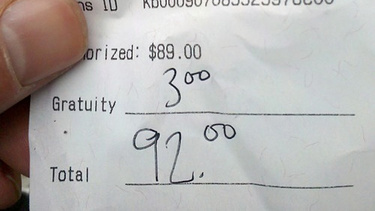 Everybody tips. This was the first simple fact that drew me to waiting tables. You go out to eat, I ask you what you want, you tell me, I bring it, and then you tip. Of all the forms of commissioned sales it is the simplest and most forgiving. Waiters have an enviable 100% closing rate. I’ve never approached a table, only to have them tell me that they are, “Just looking.” There are no tire kickers; nobody just takes a brochure and leaves; they all buy something, and good, bad or indifferent, everybody tips. Every Waiter wants a 20% tips and every customer has their own magic formula for calculating the tip they leave. It ranges from as low as a single dollar per person to 30% or better. Every person leaving a tip believes that A) they are doing what is expected of them, and B) they are being generous. Sure, bad tips happen to good waiters; but even the term “Bad Tips” is subjective. Universally, 10% or below is considered bad. I think today the term is thrown out rather quickly. It gets used when the tip percentage doesn’t match the server’s expectation. It puts us in a very jaded territory to start listing an 18% tip as a bad one, just because you thought you should have made 20%. There is no such thing as closing 20% tips 100% of the time. Nobody has ever made it through an entire shift without seeing at least one disappointing 10% tip or worse. The waiters will start to grouse at anything below 17%. Going under 12% will set off a tantrum or tirade (totally behind the scenes) as though the tip was a personal insult designed to ruin their day. It’s not uncommon for a server to catalog all the “bad tips” they have received throughout the day. A list of bad tips is a horrible energy to carry around a restaurant all night. It perpetuates a self fulfilling prophecy. Just because you walk up to a table and use kind words to greet them doesn’t mean anything. Your body language gives you away. You say, “Hi, I’m here to take care of you tonight.” They hear, or see, “Hi, how are going to disappoint me tonight?’ Any decent waiter can tell you that your mindset determines everything. If you walk into work, take a long look around the room, and say, “Well, this sucks. I’m not going to make any money tonight,” then you are absolutely right. There is no better way to fail before the shift starts than to completely set yourself up to do so. Whether it’s the bad shift or the horrible station or the quality of the customer based on age, race, nationality or some other absurd prejudgment, blaming everything except yourself is the source of the problem. Good waiters make great tips; bad waiters make poor excuses. "Count your tips at the end of the When I received my first tip ever, I thought, “Wow, people just throw money at me!” I thought that I should do what it takes to feel like I deserve it. That has been my own personal mantra for over thirty years. I consistently earn, on average, 22% of my sales. As stated before, that is not from a string of back to back to back 22% tips. Its from a majority of on, near or above 20% tips, a few that fall shy of spectacular and a number of checks that are at or above 25 – 30% and higher. Just like the waiter who thinks that his night will suck, and miraculously it does, my belief system helps me earn more than most of my counterparts. Here are my beliefs: Everybody Tips People are Generous I Will Earn Every Dollar I Receive People Just Throw Money at Me I Earn More Than 20% of my Sales I Believe in Abundance They are all fairly self explanatory until you get to the last one. Either you believe in abundance or you believe in lack. If your beliefs are in a lack of abundance, it will show up everywhere in your life. I believe in the abundance of love, creativity, money, kindness, joy, knowledge, generosity, forgiveness and compassion. The world gives back what you put out. To receive love must give love. Generosity begets generosity; give more, get more. Instead of running to the table in the end to see what tip was left for you, try running to the table at the beginning and see what you can do for someone else. If you invest yourself in the forty-five minutes that you have with each guest, that last second when you collect your score card will be more rewarding. That is hospitality. That’s service. If you really want to give your psyche a break, count your tips at the end of the day, not at the end of the table. I do Waiter Boot Camps at your restaurant. Contact me to schedule a meeting. 480-600-6973
by Kris Mason 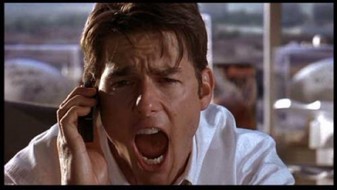 If a frog is dropped into boiling water, it will immediately react to its condition and jump back out. If a frog is placed in water and the water is brought to a boil, it will never perceive the change of its conditions and stay there until it is dead. I’m not sure what future serial killer came up with this first; but I am totally on board with the findings and how it pertains to how we stumble around the planet. I think that the current state of customer service in general and hospitality specifically is similar to the experience of the previously mentioned frog. Service and hospitality have deteriorated for so long that we seem complacent to sit in the pot and cook to death. I feel that it is time to take the mindset of the first frog, and jump out before we all perish. I don’t know where the relationship between the customer and the service provider diminished. It has become so adversarial. Customers feel as if they are being taken advantage of, and won’t hesitate to complain about how they feel they are being treated; while the provider feels like there is nothing they can do to keep everyone happy, and their customers just want something for nothing. Working as a waiter for over thirty years I’ve seen some of the co-workers my age become jaded and the new batch of twenty somethings start out quite cynical. Today, some of them take no responsibility for what they do or how they treat their guests; they are defensive, combative, argumentative and condescending. When their tip is less than generous, the customer is cheap or can’t afford to go out. A growing number of waiters today are too comfortable complaining about making $2.00 an hour and completely ignore the fact that with tips, they earn $20.00 or better (depending on where they work). The industry is caught in a downward spiral where each party’s bad behavior perpetuates the other’s worse behavior. If you are a jerk to your table, it gives them the power to be rude the next time they go out to eat. If they show up and are rude to you, you feel justified to continue being a jerk to your tables. There are some restaurateurs who think that they have solved the problem. The growing trend is to eliminate tipping. The industry leaders of this movement want to then raise their rates (to equal what your check would have been if you had left a tip) so they can distribute your money amongst the cooks and managers who have been seemingly underpaid in the past. In all the variations of the new socialist restaurant model, servers are reduced to a minimum wage position. The last time I made minimum wage was before I started working in restaurants. As soon as anyone goes from earning over $20.00 an hour to just making minimum wage, that person is gone. We have all experienced customer service at the minimum wage level. If you have visited a drive though at a fast food restaurant or stopped at a convenience store or shopped at a mall, you will catch a glimpse of the lack luster future of dining out. "Now. If you come with me, this will be The water is boiling and I want out; but I’m not willing to throw the baby out with the bathwater. I’m not interested in leaving restaurants. I like the hospitality industry. I enjoy making someone’s night. I was always drawn to creating an experience that made people feel special. I learned early that by controlling my own actions I could influence the generosity of the people I waited on. I now nominate myself to be the official Voice of Customer Service as well as the new Ambassador of Hospitality. I will now take my thirty years of accumulated experiences and apply them to saving the experience known as Dining Out. Although I’m self appointed, I would like to be joined by any waiter who isn’t interested in seeing their job disappear. I will keep sharing my service philosophies publicly and look for anyone who is willing to join me in this industry saving crusade. I’m like Jerry Maguire, standing in the middle of the office cubicles, shouting out, “Who’s coming with me!?” The only way to keep my wages high, the way I like them, and not be replaced by the minimum wage (or worse, by a self-serve, touch screen) then we as waiters have to change our side of the relationship so that we can change the way a person walks into a restaurant and treats us. I am no longer interested in who started the bad behavior. I’m more interested in drawing the line in the sand and changing the bad behavior moving forward. I will do this alone if I have to; but I would much rather be part of a movement of people who want to keep their wages intact. When somebody brings up the idea of running a restaurant without a wait-staff, I want the loudest voice to be the customers who are not interested in seeing another customer service industry filled with disconnected, disgruntled minimum wage earners. Then let this movement begin. “Now. If you come with me, this will be the moment of something new and fun and inspiring in this GOD FORSAKEN business.” (That’s a Jerry Maguire quote, if you’re keeping score at home.) If you are truly coming with me, then let’s announce our intention and asks our brothers and sisters of this great and noble profession to proudly do the same. Stand up and proclaim, “We’re upping our standards! Up yours!” Oh, and go easy on the frog experiments. I do Waiter Boot Camps at your restaurant. Contact me to schedule a meeting. 480-600-6973
by Kris Mason  I recently attended back to back weddings; both were a spectacle. Down to the smallest detail, every aspect of these functions would rival the greatest Pinterest posts imaginable. One was at a Reception Center and the other at a Country Club. One was indoors, one was out. One was overflowing with rustic charm, the other was rather formal. Although each ceremony and reception was completely different they both had one glaring thing in common. The service was horrible. I’m not talking about the wedding ceremony (church service), I’m talking about the table service; or more specifically, the banquet service. It seems hard to believe that with tens of thousands of dollars on the line, the service was… eh… okay. There was nothing catastrophically wrong, just okay. Lackluster. Forgettable. That’s what you get with minimum wage employees in the service industry. Weddings weren’t always like this. I’ve waited tables for over thirty years and at one point I was even a banquet server. When you wait tables for a long time, you learn to go where the money is and in the 1980’s the money was in banquets. It was the place where the average person could live out their Lifestyles of the Rich and Famous fantasy even if only for an evening. We made so much money because as servers, our tip was included in the contract. At only 10%, the tip, when divided amongst the number of servers working the function, averaged out to be over $15 per hour. Not that great until you figure out that at the time, minimum wage was $3.35 an hour. We ran our butts off, and would do anything to make our guests feel like they were the most important person in the world (whether they were in the wedding or just at the wedding). Over the course of a few years, the industry got greedy. The large Hotel chains thought that banquet servers earned a disproportionate amount of money when compared to everyone else involved behind the scenes, so they began withholding portions of the contract tip and raised the pay of those people earning less. When the servers complained, the Hotel gradually raised the tip percentage from 10% to 12% to 15% and in some instances all the way up to 18%. The greed came when the Hotel decided to not pay out the entire tip to the employees. Nobody can say conclusively where the extra money went; but since it didn’t end up going to the employees, a law suit was filed. "It’s hard to believe that the banquet industry is even a part of the hospitality industry at all." In the end we won… and lost. We won the right to keep all of the money that was listed in the contract as a Tip. The Hotel chain’s lawyers figured out that if they changed the word from Tip to Service Charge on the contract, the Hotel was entitled to the entire amount and was no longer the property of the wait staff. When a guest asked about the Service Charge on the contract, they were still told that it was to cover paying the waiters even though it was no longer true. Needless to say, working together as former plaintiffs and defendants wasn’t an ideal situation for everyone. Eventually, at the facility where I worked, we were offered a flat rate of $7 per hour, take it or leave it. Of course I left it; I was used to making five times as much. When you wait tables for a long time, you learn to go where the money is. For a while, the Hotels did okay. They were paying more than double the minimum wage; but the staff wasn’t as willing to jump through hoops like we were, mainly because the newly hired staff didn’t have restaurant experience. They had no point of reference as to why they should jump through a hoop in the first place. Today, functions like wedding receptions pay at or near minimum wage… and it shows. It’s hard to believe that the banquet industry is even a part of the hospitality industry at all. There is a small sector of the restaurant business that is toying with the idea of doing away with tipping altogether. Like Danny Meyer of the famed Union Square Hospitality Group in New York City, he is planning on raising his menu prices almost 30% to pay his cooks and his managers a more competitive wage in the marketplace. His plan must also be doing away with his entire wait staff. In his restaurants, Meyer intends on paying his waiters $9 per hour with no chance of receiving a tip of any kind. There is no waiter on the planet that will go from earning $20 to $30 per hour to accepting $9. As of January 1, 2016, $9 is the current minimum wage in New York City; and The Governor is working with state officials to raise that to $15 for fast food workers. How do you expect people to pay menu prices that are 30% higher while receiving the highest quality of service that a minimum wage income can buy? Why put up with the hassle of waiting tables in a full service dinning room for $9 per hour when for $15 you can simply stand there and learn the phrase, “Do you want fries with that?” When you wait tables for a long time, you learn to go where the money is. I do Waiter Boot Camps at your restaurant. Contact me to schedule a meeting. 480-600-6973
by Kris Mason 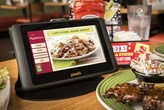 From the days of handwritten orders, the restaurant industry has embraced the latest technology to streamline ordering and eliminate errors. Point of Sale (POS) systems change as often as computer operating systems. From behind the scenes, waiters speculate that we will eventually take orders from an app on our smart phones. Imagine my surprise when I went into my neighborhood Applebee's and found a clunky touch screen POS system on the table. Bright graphics and flashy photos enticed me to look a little deeper and it seemed as though I could have ordered everything from there. Then our waiter showed up. When I asked him how this thing worked, he replied, “Poorly.” Ah… I like my sarcasm dry with just a bitter undertone. After a few questions back and forth, he seemed to feel that most people were reluctant to use it at all, and those who did try were either technologically inept or overly i-snobby to use such an inferior piece of technology. The rest were simply incapable of pulling themselves away from their own phones to even notice. I can definitely picture that. I’ve stood behind enough people at an ATM or at a grocery self-checkout to see that despite the widespread use of handheld technology, the general population has a tough time with basic touch screen interactions. If not that, it’s the ones that do know how to use them, but choose to relinquish control to their three year old kids in what seems to me the most ill-timed “teaching moment” ever. As the industry debates how best to do away with waiters, it seems like some national dining chains (including Applebee’s and Chili’s) believe that a self-service, touch screen tablet (of sorts) is going to be the magic formula to make customers happy and keep them coming back. Why would the casual dining sector of the restaurant industry want their guests to place their own orders and eliminate their own table service?
In a restaurant, the waiters take all the heat. If the wait for a table is too long, it’s the waiter’s fault; If the music is too loud, it’s the waiter’s fault. If the room is too cold… the drink isn’t strong enough… there was supposed to be a side salad and the customer got fries, waiter’s fault. Nobody blames a cook for the wrong order, or a manager for the comfort of the room. How a waiter manages each of these situations is what makes a guest feel like returning. So, you want a machine to replace me? Are you prepared to be at fault for all the things that go wrong? When you use the touch screen to order your burger cooked medium, and you complain because you don’t like any pink in your medium burger (a burger with no pink is actually well done), that was your fault. When you forget to order your margarita without salt, you can’t say that you specifically told your server, several times, “No salt.” Nobody likes to ask a restaurant employee for help, only to hear, “That’s not my table.” If you take away the waiter and replace him or her with a self-serve POS and a minimum wage earning food runner, all accountability is lost. Without a waiter, you are nobody’s table; and if you placed the order and mistakes are made, that’s on you. As much as I seem to toot my horn, I’m the first to admit that I don’t save lives. I don’t create peace in the Middle East or heal the planet; I handle things. I take care of a million tiny details, the slow death by 10,000 cuts. If I handle them properly, you will have no idea I was there; but if one or two of those tiny things are allowed to get bigger, your experience will be diminished. I’m not your oncologist; I’m your concierge. I handle things all day long. I’m your discomfort filter. I’m a political spin machine. I correct mistakes big and small. Things have to go horribly wrong for you to ever leave my table unsatisfied or worse, ask to speak to someone in charge. By the time I’m done with you, the only thing you will need my manager for is to sing my praises. If you want to go out and eat and not leave a tip there are plenty of choices; and not just fast food. If you want a decent burger and fries and don’t feel like leaving three bucks to some college kid, go to Fuddrucker’s. Asian food? Pei Wei. Order at the counter and seat yourself. If you feel like doing a little more work on your own, there are contemporary buffets like Sweet Tomatoes and Golden Corral. Knock your socks off. Isn’t the point of going out to dinner to be waited on or even pampered just a little? Sure, you can get up and get your own refills; but isn’t that what you do at home? Let’s keep the touch screen off the table and in your phone, and let me... you know… handle things. I do Waiter Boot Camps at your restaurant. Contact me to schedule a meeting. 480-600-6973 by Kris Mason 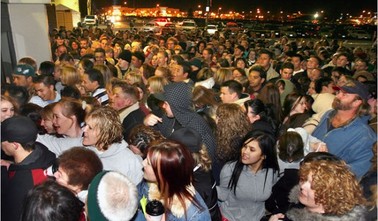 "There is no longer a clear start to the Holiday Shopping Season. Black Friday Sales throughout the month of November is just one example of how a single, simple day has been destroyed. Promotions like Cyber Monday starts Saturday and Door Busters Every Two Hours weren’t enough to push people over the edge. I personally don’t understand how I’m supposed to want to bust down a door that’s already open. It was called black Friday before it was ever marketed as “Black Friday.” The day after Thanksgiving marked the day that began the Christmas Shopping Season. See, the term is so old, it has been around since you could call “Holiday” shopping what it really is; and on that Friday, retailers begin operating in the “black” for the first time for the year rather than in the “red.” Once the internet took over there were suddenly websites that were huge databases for Black Friday sale prices. Shoppers became strategic and retailers grew increasingly more and more aggressive. Friday morning, 6am openings turned into 5am and then 4am; people kept showing up each time the opening was pushed back earlier and earlier. And then came… the tipping point... Midnight. Some people called, 'foul!'; how could that money monster, Walmart, force it's employees to do this? But midnight became 10pm, which became 8pm, which became 6pm. Lines were blurred now. Is it Black Friday or Black Thursday? People on social media exploded with outrage. 'How dare the retailers expect people to work on Thanksgiving! This is some serious, sacred family time you’re messing with, Big Business!' Where is this venom coming from and why is it so… misplaced? There is such a huge public discourse about taking retail workers away from their family in the name of the all mighty buck; so much so that some thirty plus retailers this year are making a public declaration that they will be closed on Thanksgiving. But it’s not just misplaced outrage, but hypocritical, selective outrage. In thirty years of waiting tables, I can count on one hand how many times I’ve been home, all day with my family, on Thanksgiving. Three of them were because I was lucky enough to be working for a family that closed their restaurant for the holiday. "I’m just suggesting that you can all drop the false outrage." We all work on Thanksgiving. We take care of the people who don’t cook or can’t cook, or would simply rather somebody else do all the cooking and cleaning so you don’t “miss time with your family.” Nobody gives a damn that we do this; you expect us to be there. Retailers are supposed to have a free pass on this day while countless other industries toil unnoticed. Your expectation of how many people should be there for you is absurd. You expect the NFL to send six teams to play each other in three cities and all the stadium workers and all the broadcast professionals in front of and behind the cameras to all not be with their families so that that you can enjoy your “day that nobody should have to work.” And it’s not just Thanksgiving, it’s all holidays. You can find us pouring your champagne as you ring in the New Year. We make your Valentines dinner romantic. We take care of you and your family on Mother’s Day and Father’s Day. We bring you all together for three day weekends and Easter Brunch. We’re even open on the days when you are supposed to be in your own backyard doing your own grilling, like Memorial Day, Labor Day and the 4th of July. And unlike the days when it was only Chinese food restaurants, most major hospitality chains and fast food operators are even open on Christmas. This is not a rant. It isn't a complaint or even a cry for sympathy. I’m just suggesting that you can all drop the false outrage and simply admit that your plea for keeping families united over the holidays doesn’t include the families of our Military, Police and Fire Fighters, Doctors and Nurses, Hotel workers, Airline Pilots and Flight Attendants, Radio and Televison Crews and Anchors, Cooks and Dishwashers in Restaurants and Fast Food Chains, Movie Theater Employees and Sports Franchises, Convenient Store Clerks and Gas Station Attendants, Cab Drivers and Bus Drivers and the countless people who support the above mentioned industries behind the scenes; basically, anybody else who makes your personal family experience safer and more enjoyable. So in the name of giving thanks and good will and holiday cheer and all that, be mindful of those who can’t be with their families so that you can enjoy yours. Be humble, kind, thankful, joyous, compassionate, gracious, thoughtful, merry, caring, cheerful and above all else, generous. You can start by sharing this post with anyone you know who has to clock in this Thanksgiving day. I do Waiter Boot Camps at your restaurant. Contact me to schedule a meeting. 480-600-6973 by Kris Mason  In any transaction that includes adding a gratuity, there are really only two parties involved, the person giving the tip and the person receiving a tip. It really shouldn’t concern any other individual; despite the fact that the internet is buzzing with a third party who feels that tipping should be scrubbed from the surface of existence. The person receiving the tip has a very clear idea what they want to see happen. They want to either find a large pile of cash, enough to make it rain; or turn over the charge slip and reveal a 7000% tip and a cute little hand written note about being the recipient of “paying it forward.” The person leaving a tip knows how it goes too, based on the world’s most seemingly ridiculous sliding scale. It predates the diner even knowing why or how to tip, based on a combination of influences, ranging from friends to family to unknown cultural cues. It’s too simple to just say that “good tips” are equated to “good service,” because I’ve seen the opposite happen on numerous occasions. Every person who tips (whether it’s percentages as low as 5% or as high 40%) believes that their method, their formula is the way it is supposed to be. You double the tax. Never more than 10%. You double the first number. It’s $2 on ten. You start at whatever percent and go up for various things done above and beyond. You start at that percent and take away based on crimes of customer service or gross negligence. If things go incredibly well or horribly wrong a tip can be used as a statement; but that cannot be a rule set in stone. In some cases, not tipping is simply a nationality norm. Tipping doesn’t exist is some countries and can rear its ugly head during a visit to the States. There are people from this country who don’t tip because they don’t tip. My point is simply this. People tip… and they don’t. Everyone who waits tables does so with full knowledge of the possible outcome. Whatever your secret formula is for tipping, you’re absolutely correct; and it’s my job to cater to you so you feel comfortable enough to part with that wildly random dollar amount. We do the job because more often than not it works out quite well in our favor. Despite the fact that waiters and waitresses spend too much time bemoaning a low percentage on a large check, if we were losing money, we wouldn’t be there. We are survivalists; we go where the cash is. I am honestly surprised when I come across articles or blogs that talk about abolishing tipping. They’re very well researched, mostly referencing some book from the early 1900’s, trying to drum up outrage by playing a race card, or at least suggesting some form of class warfare. I’m more amazed that some restaurant owners have really taken to the idea. In the most notable move so far, New York City restaurant mogul Danny Meyer has announced he is doing away with tipping at all his Union Square Hospitality Group restaurants. After seeing this, I found multiple re-postings of the same article. Meyer has wanted to end tipping for a couple decades now and finally feels that this is the (his) time. Surprisingly, I liked what he was talking about. I liked that he was willing to tell his customers that his prices would be raised to compensate for no longer having to tip. For the customer, nothing actually changes. If you normally spent $100 on dinner and left a $20 tip, your night would cost you $120. Gone would be the “Tip” line on a credit card slip and customers would go home knowing that the server was fairly compensated. Sounds great, right? No harm, no foul? That’s what I thought; but it turns out I was wrong. I missed it because each version of the article that I’d previously seen was redacted. Edited. Why would you re-post half an article? It seemed that every person or website that had re-posted this story left out the best part of Danny Meyer’s plan. "Did Mr. Big-Shot New York City Restaurant Genius actually just steal the tip off my table?" You see, Meyer admits that since 2008 he has had a very difficult time retaining his kitchen staff because wages have been flat for almost a decade. His “Tip-Free Plan” includes raising his prices twenty to thirty percent and locking in a “Fair Wage” for everybody in the restaurant. Here’s what it looks like: Waiters and Bartenders - $9.00 per hour Back of the House and Cooks - $11.00 to $15.00 per hour Management - $25.00 per hour Wait… what?! Did Mr. Big-Shot New York City Restaurant Genius actually just steal the tip off my table and give it to the cooks and the managers?! Are you kidding me? According to Meyer, that’s the best way he knows how to fix the problem. Taking away the tipping system that some find awkward and few deem unnecessary and changing it into a redistribution of wealth is beyond fairness, it’s flat out Socialism. Waiting tables is the perfect exercise in Libertarianism. Every server is given the same set of tools, the same menu with the same prices and the same number of people to wait on serving the same food. Through this, and random chance (a luck of the draw), no two servers will produce the same results. We are created equal to pursue happiness with not a single guarantee about the outcome or result. People tip… and they don’t. Considering, in most general cases, there is a manager for every ten to twenty waiters, I’m guessing at the Union Station Hospitality Group there won’t be a manager position for every server who can’t afford a 60% cut in pay. So here is my simple prediction. Any waiter worth his salt will leave there and take a job anywhere else in the city where the owner hasn’t lost his mind. Mr. Meyer, we already know what $9 an hour hospitality looks like and it typically includes the question, “Do you want fries with that?” You should take a page from the Bernie Sanders playbook. If you really want to punish the one making all the money to compensate those at the the bottom, instead of taking the money from those filthy rich waiters and giving to the cooks and managers, why don’t you take the money out of of your own incredibly deep pockets and make sure all your kitchen staff is making as much as your poor waiters. Sounds fair to me! I do Waiter Boot Camps at your restaurant. Contact me to schedule a meeting. 480-600-6973
|
AuthorWith more than 30 years of restaurant experience, Kris Mason offers an insight into the industry seen from the front door to the dumpster out back and all points in between. Archives
July 2017
|
 RSS Feed
RSS Feed